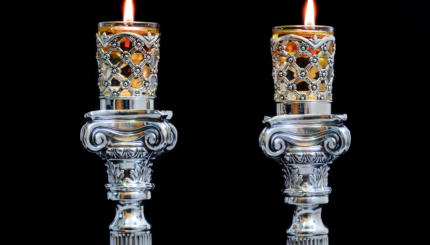Shavuot begins at sunset on Tuesday, June 7, 2011. It is celebrated on Wednesday, June 8 and Thursday, June 9.
What is Shavuot?
Shavuot, or the “feast of weeks,” is celebrated seven weeks after Passover. It marks the culmination of the Omer period. Although Shavuot began as an ancient grain harvest festival, the holiday has been identified  since biblical times with the giving of the Torah on Mount Sinai.
since biblical times with the giving of the Torah on Mount Sinai.
• Read more about Shavuot from the time of the Bible to the time of the Temple
• Read more about the different Jewish denominations’ approaches to revelation at Sinai

Help us keep Jewish knowledge accessible to millions of people around the world.
Your donation to My Jewish Learning fuels endless journeys of Jewish discovery. With your help, My Jewish Learning can continue to provide nonstop opportunities for learning, connection and growth.
What are some customs and practices for Shavuot?
 In keeping with the agricultural origins of the holidays, on Shavuot some people decorate their synagogues and homes with flowers and foliage. There is a long-standing custom of staying up all night to learn Torah. One special feature of Shavuot prayer services is the inclusion of the Book of Ruth, the story of one righteous convert to Judaism.
In keeping with the agricultural origins of the holidays, on Shavuot some people decorate their synagogues and homes with flowers and foliage. There is a long-standing custom of staying up all night to learn Torah. One special feature of Shavuot prayer services is the inclusion of the Book of Ruth, the story of one righteous convert to Judaism.
• Read more about all-night learning on Shavuot
• Read more about the Book of Ruth and Shavuot
What foods are traditionally eaten on Shavuot?
 It is customary to eat dairy foods on Shavuot, and a number of theories have developed to explain this practice. Here are some delicious dairy recipes for Shavuot:
It is customary to eat dairy foods on Shavuot, and a number of theories have developed to explain this practice. Here are some delicious dairy recipes for Shavuot:
• Blintzes
• Cheesecake
• Cheese Lokshen Kugel
• Rugelach
• Sour Cherry Soup
Shavuot
Pronounced: shah-voo-OTE (oo as in boot), also shah-VOO-us, Origin: Hebrew, the holiday celebrating the giving of the Torah at Mount Sinai, falls in the Hebrew month Sivan, which usually coincides with May or June.

Help us keep Jewish knowledge accessible to millions of people around the world.
Your donation to My Jewish Learning fuels endless journeys of Jewish discovery. With your help, My Jewish Learning can continue to provide nonstop opportunities for learning, connection and growth.
Torah
Pronunced: TORE-uh, Origin: Hebrew, the Five Books of Moses.

Help us keep Jewish knowledge accessible to millions of people around the world.
Your donation to My Jewish Learning fuels endless journeys of Jewish discovery. With your help, My Jewish Learning can continue to provide nonstop opportunities for learning, connection and growth.



